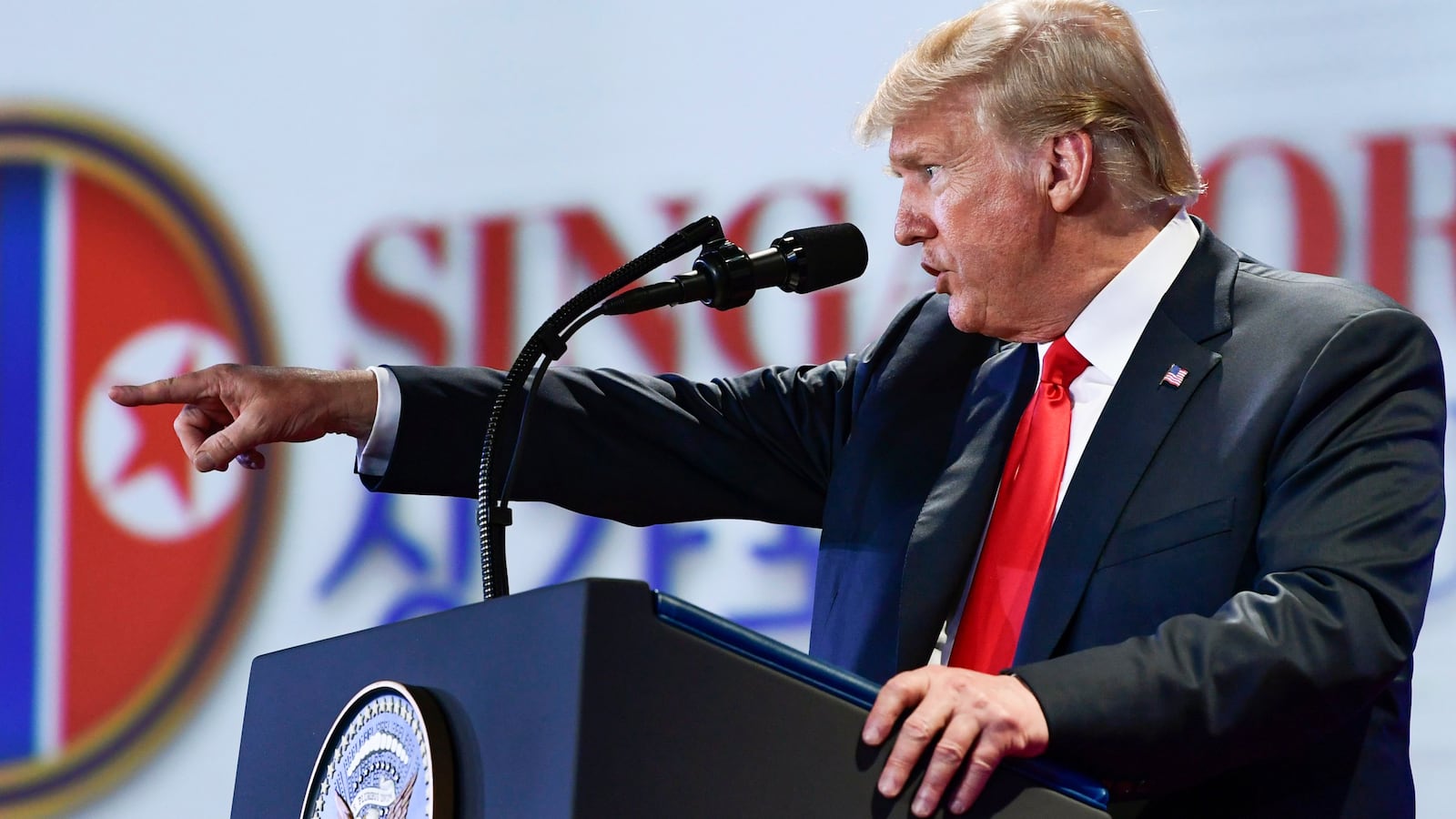SINGAPORE — By Tuesday afternoon here, it was as if the signatures flourished by President Donald Trump and Kim Jong Un on their joint statement had begun to fade already beneath the hot light of criticism. Analysts made the point repeatedly that the “summit of the century” had come and gone with very little to show. At least, not for Trump.
Sure, there had been a lot of tough talk beforehand. A senior White House staffer reportedly said the Trump Doctrine is, "We're America, Bitch." The optics and drama had drawn the superstars of television news to this island city state and, for a few days, gave the impression that Trump might be able to return home with one, just one, major foreign policy victory.
But when the document was seen (shown to the press by Trump when he showed off his signature) it was very hard to claim that the omission from the summit declaration of the hitherto sacred formula “CVID”—complete, verifiable, irreversible denuclearization—was anything other than a huge concession to Kim Jong Un. He loathes the words that would actually compel him to surrender his arsenal.
Instead, Kim would only sign on to wording that says his country "commits to work toward complete denuclearization of the Korean Peninsula," which is by any standard pretty tentative language.
Until this week, CVID was supposed to be sine qua non: the sanctions would not be lifted until that was achieved. But at his rambling press conference after his morning of diplomacy, Trump even revealed the extent of the compromise he’s willing to make: “Complete” has become, maybe, “20 percent.”
That part of the press conference transcript is worth reading not only for its substance but also for its incoherence. (To be sure, Trump said he had not slept for 25 hours, but that probably was not the only reason Kim remarked earlier in the day that the whole scene was like something out of “science fiction,” or, perhaps in better English, that it was all pretty surreal.)
Trump admitted he’d been told complete, verifiable, irreversible denuclearization could take 15 years, and he obviously couldn’t square that with Kim’s demand for sanctions relief soon.
“A 15-year process? Assuming you wanted to do it quickly, I don’t believe that,” said Trump. “I think whoever wrote that is wrong. There will be a point at which when you are 20 percent through you can’t go back.”
How does Trump know this? “I had an uncle who was a great professor for 40 years at MIT. I used to discuss nukes with him all the time. He was a great expert. A great brilliant genius. Dr. John Trump. MIT sent me a book on my uncle. We used to talk about nuclear. You talk about a complex subject. It is not just get rid of the — rid of the nukes. When you hit a certain point, you cannot go back.”
How long will that take? “We don’t know, but it will be quickly.”
At other times Trump resorted to the language of a declaration as signed by Kim and South Korea’s President Moon Jae-in at the truce village of Panmunjom on April 27: “We are asking for the establishment of a new U.S.-DPRK relationship,” and when it came to “verification” of whatever the North Koreans were doing to get rid of their nukes and missiles, “it will be verified as we develop a lot of trust.”
Oh yes, Trump said, U.S. and international inspectors would be there to be sure Kim was living up to his word, but Trump seemed to have every expectation he would. “He [Kim] was very firm, in fact, he really wants to do this.”
(One thinks back to that time George W. Bush said after meeting Russia’s Vladimir Putin, “I looked the man in the eye. I found him to be very straightforward and trustworthy . . . I was able to get a sense of his soul.”)
In the real world, by any estimate, and with complete goodwill, given that the North Korean reactor at Yongbyon 60 miles north of Pyongyang has fabricated 40 to 60 warheads and the best spy satellites are incapable of revealing what else the North has going at facilities in caves and tunnels around the country, dismantling and verification are going to go very slowly.
Just as important as the sanction issue is the future of the 28,500 American troops in South Korea, many of them now headquartered at a sprawling, expanding base about 40 miles southwest of Seoul. “I want to bring our soldiers back home,” said Trump, reviving a mantra that he recited often during his presidential campaign. But, he added, “that’s not part of the equation right now.”
Then, almost as an afterthought, he added, “We will be stopping the war games” – that is, “unless or until” it’s clear North Korea is not denuking “as it should.”
That announcement might be sensational considering that North Korea has objected strongly every time American and South Korean troops engage in joint exercises, most recently “Max Thunder” that featured warplanes from both countries zipping above the South for 10 days in May.
U.S. and South Korean generals, who love every chance they get to test their toys, let it be known they had not heard a thing about cancelling or even toning down the war games, which Trump described as “provocative and expensive.” (The word “provocative” is a favorite description of the war games in North Korean propaganda. Probably Trump heard it a lot before and during his meeting with Kim.)
A spokesman for U.S. Forces Korea had no “updated guidance on execution or cessation of training exercises,” notably a show called “Ulchi Freedom Guardian” that is staged each August involving thousands of troops. As far as the American forces in Korea are concerned at this point, he said, “we will continue with our current military posture.”
A South Korean official at the national security office was equally emphatic. There was, he said, “no change at all.”
Kim Jong Un, before taking off aboard an Air China plane in the evening, avoided any comment beyond the pleasantries that he had exchanged with Trump when they met in the Capella Hotel on secluded Sentosa Island, but he seemed to have triumphed simply by making certain the document that he signed did not go beyond generalities.
Kim did agree on one added touch that Trump treated as a major victory – that was the last of the four points, which opened the door for American search teams to look for the bodies of about 6,000 U.S. troops still listed as missing in action from the Korean War. Trump said that on the campaign trail relatives of the missing often approached him asking what he might do about this if elected.
Trump neglected to mention, however, that in the past American search teams already visited North Korea in search of remains. U.S. diplomats have been raising the possibility of resuming searches in recent years, but those overtures were rejected when tensions rose dramatically in 2017. (One might also note that the image of American troops from the Korean war, as taught to the North Korean public in the famous “Atrocity Museum,” is nothing short of satanic.)
If the declaration appeared disappointing, Trump sought to give the impression the process would move at almost lightning speed. Kim, he said, might even begin issuing orders “as soon as he arrives” back in Pyongyang. He suggested there was already a deal, made after the declaration was signed, for Kim to shut down a missile engine test site which, Trump said, was clearly visible to U.S. satellites. Of course the big issue is not what the U.S. can see, but what it can’t.
“We have to get things moving fast,” said Trump, blaming his predecessors in the White House for failing to resolve the problem of North Korea’s nuclear program. “It would have been much easier years ago,” he said. “I was given a tough hand” just as he was with “the Iran deal.”
The comparison was unfortunate considering “the Iran deal” actually had stopped Iran from developing warheads or accumulating enough fissionable material to produce them.
Trump repeatedly deflected questions about North Korea’s human rights record, distinguished as the world’s worst. He said he didn’t really want that to get in the way of the summit negotiations, such as they were. Brushed aside were tens of thousands of prisoners in the North’s sprawling gulag system, along with Kim’s murder victims, including his half brother. In Trump’s exercise of style over substance, he was not going to let human rights considerations deflect from delusions of success.
Instead, Trump preferred to accentuate the positive, the guarantees the United States is making to Pyongyang for the security of the Kim regime, and the bright future ahead for the people of what’s long been called the Hermit Kingdom.
“He’s going to be happy,” Trump told George Stephanopoulos on ABC. “His country does love him.”






